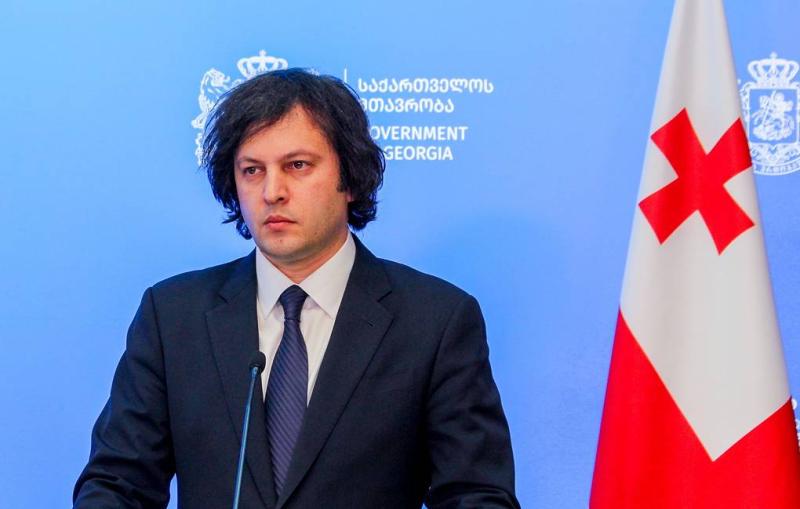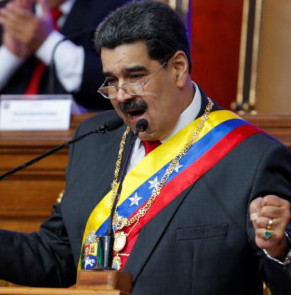
- Press review: US lets Kiev use anti-personnel mines and Iran may halt uranium enrichment
- Press review: Uranium costs soar as Moscow updates nuclear doctrine and US OKs attacks
- Press review: Russian air defenses can down Western missiles as EU conducts live exercise
- G20 leaders adopt Rio de Janeiro Summit Declaration
Ukraine and Israel battle for the spotlight at EU summit; Georgian legislators approve the first reading of a controversial foreign agent bill; and Russian peacekeepers depart from Nagorno-Karabakh. These stories topped Thursday’s newspaper headlines across Russia, according to TASS News Agency.
Izvestia: Ukraine, Israel vie for attention at EU summit
On Wednesday, EU leaders met in Brussels for a two-day summit to discuss Ukraine and the Middle East. Kiev, still desperate for air defense systems, is taking a backseat to the latest escalation between Israel and Iran, experts say.
G7 foreign ministers will also talk about additional support for Ukraine at a meeting later today. Meanwhile, standalone bills on aid to Ukraine, Israel and US allies in the Asia-Pacific hit the floor at the US House of Representatives on Wednesday, and US President Joe Biden is ready to sign off on each assistance package separately.
While the EU budget through 2027 already envisages allocating over 64 bln euros in funds to Ukraine, Brussels can review the Ukraine Facility at the end of this period, St. Petersburg State University professor Natalya Yeryomina told Izvestia. "The faster Ukraine falls, the less [the EU] will be willing to support Kiev after 2027, when the 'multiyear financial facility' expires," she explained.
Meanwhile, issues related to the Middle East are at the forefront of the summit’s agenda. Events in the Middle East have disrupted supply chains, and the EU's decision to exclude Russian and Belarusian exports to its market has transnational logistics companies based in the EU feeling the after-effects, as the ten biggest service providers are all taking a hit now, the expert said.
Moreover, any deterioration of the situation in the Middle East will inevitably lead to new waves of migration, experts say. "The EU is facing a very large influx of illegal migrants," said Vladimir Olenchenko, a senior researcher at the Institute of World Economy and International Relations (IMEMO). The bloc encountered similar problems in 2015, when the situation in Syria worsened. At that time, the only thing that kept refugees from flooding into Europe was Turkey, which opened its doors to them, he added.
Izvestia: Georgian lawmakers vote to approve foreign agent bill
The parliament of Georgia has approved the first reading of a draft law on the Transparency of Foreign Influence, with 83 MPs voting in favor of the bill. The opposition had been fighting the bill all week long, and chose to boycott the vote. They argue that the bill mirrors a similar Russian law, while the authors of the measure say the draft law is modeled after a US law, the Foreign Agents Registration Act (FARA).
Kremlin Spokesman Dmitry Peskov said the Georgian bill stood on its own and was not influenced by Russia, adding that "attempts are being made to use this domestic political process as a tool to provoke anti-Russian sentiment." According to Peskov, this initiative "is definitely coming from the outside."
On Wednesday, Georgian President Salome Zurabashvili promised to veto the bill if it was adopted in three readings. She also convened an emergency meeting with the ambassadors of the EU, the United States and Great Britain in a push to garner international support as her country moved along the "European path."
The leader and political secretary of the opposition party Alliance of Patriots of Georgia, Georgy Lomiya, said: "The ruling party is seeking to weaken <…> right-wing liberal opposition parties being sponsored from abroad." Their goal is to prevent them from taking part in the October parliamentary election, he argues. Even if the bill is passed in all three readings and becomes law, "certain opposition forces will refuse to implement it." This could complicate relations with the West, which may recognize the coming election as illegitimate, he warned.
In terms of the electorate, protests may continue even after the law goes into effect, putting the ruling Georgian Dream party in a tough spot, Georgian political analyst Nika Chitadze told Izvestia. Meanwhile, the majority of Georgian nationals support European integration, he said, as opinion polls show that most Georgians favor accession to the European Union.
Kommersant: Russian peacekeeping mission in Azerbaijan comes to an end
On April 17, Russian and Azerbaijani officials confirmed the departure of Russian peacekeepers from Nagorno-Karabakh, the region over which Baku regained full control last year. The move marks a major milestone: first, the Karabakh issue has been completely resolved, and second, Russian peacekeepers are leaving a former Soviet republic for the first time ever.
While Hikmet Hajiev, assistant to the president of Azerbaijan, and Kremlin Spokesman Dmitry Peskov confirmed the withdrawal on Wednesday afternoon, many questions remain. No timeframes for the pullout are known, nor is it clear if all Russian troops will leave or if some will stay, say, to work with Azerbaijan in demining, something the Russian peacekeepers have been focusing on since 2020.
While it is true that Baku has never stated outright that the Russian peacekeeping mission must leave now that the Karabakh conflict has been settled, it did say that peacekeepers would stay on Azerbaijani soil until November 2025, so the early withdrawal of Russian troops suggests that Moscow and Baku might have made a deal behind the scenes. In an interview with Kommersant, director of the Baku-based Caucasus Center for Political Analysis Ahmad Alili said that Baku and Moscow were entering a new era in relations. "Any factors that could hamper bilateral cooperation are now gone," the expert maintains.
Sergey Melkonyan, a researcher at the Russian Academy of Sciences’ Institute of Asian Studies, recalled that Moscow has long been pushing Azerbaijan to join the Eurasian Economic Union (EAEU). Last May, Azerbaijani leader Ilham Aliyev told an expanded meeting of the Supreme Eurasian Economic Council in Moscow that Baku would be able to become a full-blown member of the alliance after it signs a peace treaty with Yerevan.
Melkonyan also believes that in time, we will find out whether some kind of deal was made between Moscow and Baku in connection with the early withdrawal of Russian peacekeeping troops. To him, the move means that the Armenians have dropped the idea of returning to Karabakh altogether.
Vedomosti: EU pipeline gas imports soar to record highs in March
In March, the European Union increased its purchases of pipeline gas to 14 bln cubic meters, the highest amount since December 2022, due to a rise in Russian exports, according to the Gas Exporting Countries Forum (GECF).
Russian gas supplies were a major driver behind the increase in pipeline gas consumption in EU countries, the GECF said in a report. According to it, in January-March, they rose by 23% year-on-year to some 7.2 bln cubic meters, while Russia accounted for 18% of the EU’s pipeline gas imports, a 3 p.p. rise from the first quarter of 2023.
This year, European importers are turning to pipeline gas as it is selling for less than LNG, analysts interviewed by Vedomosti say. Sergey Kaufman, an analyst at Finam, said that last year, LNG was cheaper than pipeline gas, while in 2024, prices have fluctuated, and in February and March, LNG was more expensive. Kaufman argues that the price advantage of Russian natural gas "faded in April," therefore, this month, the EU’s total pipeline gas imports may be lower than in March.
National Energy Security Fund lead analyst Igor Yushkov says Russian gas supplies to Europe may remain where it was in the first quarter in the next few months, while he expects total gas consumption in the EU to remain at around last year’s level. And Kaufman forecasts a 2-2.5% rise year on year.
Kommersant: Crypto market tightens as price of Bitcoin falls
The price of Bitcoin dipped below $60,000 for the first time since February. The world’s leading cryptocurrency has declined by 13% in the past two weeks amid active short-selling. Experts say the fall was caused by the Fed’s rhetoric and rising geopolitical tensions.
"Over the past four years, the crypto market has been going this way, and now it has actually happened, the hype around Bitcoin is at its peak, bringing the price of the cryptocurrency to local highs," Vladislav Utushkin, the founder of MarsDAO, told Kommersant. This may pave the way for a sell-off as people look to capitalize, he believes.
And this downswing may last for quite a while, market players say. Sergey Mendeleyev, the head of InDeFi Smart Bank, says the largest cryptocurrencies may drop by 25% to 30% by the summer. "Judging from past years, the correction may last three months or longer," Utushkin said.
However, experts note that "multiple black swan events have tempered the industry." "Panic selling, even if truly negative news comes, is unlikely to be as deep as before," Utushkin added. His best-case scenario sees Bitcoin prices hovering at around $100,000 by year-end, while the cryptocurrency may go into 2025 at near its current values should things go south, he concluded.
TASS is not responsible for the material quoted in these press reviews









